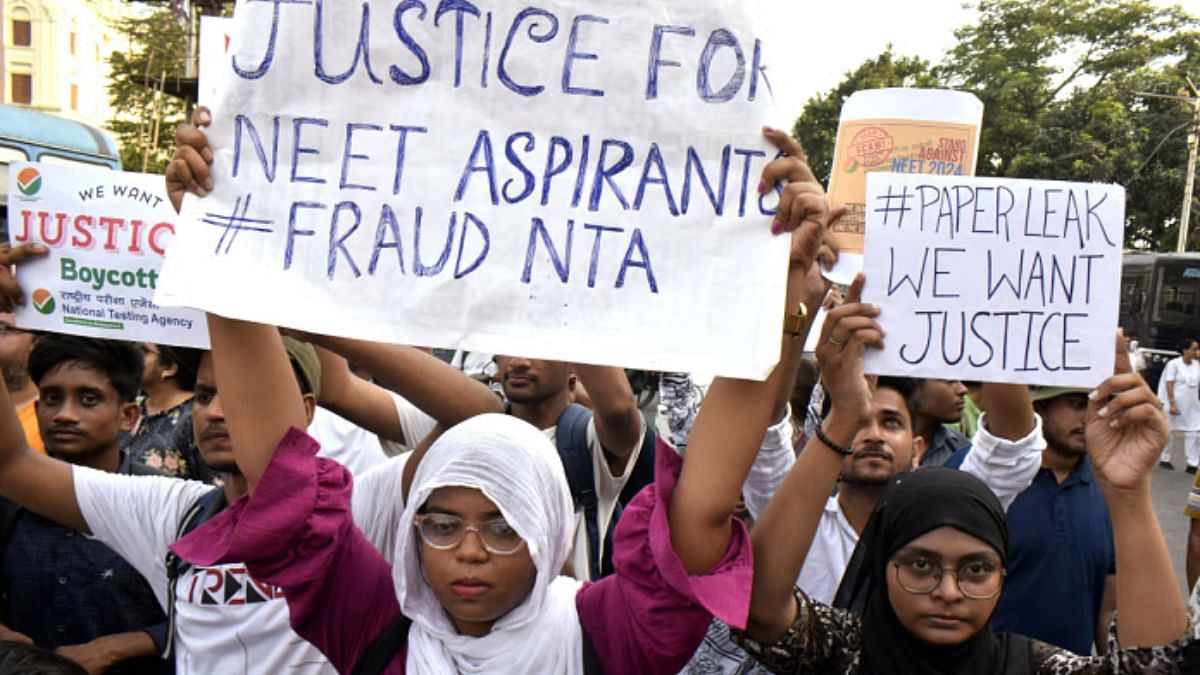New Delhi: The government-appointed panel on exam reforms has recommended a hybrid model for entrance exams, prioritising online assessments and a multi-level NEET-UG, while also suggesting limits on outsourcing test centres, the hiring of permanent staff for the National Testing Agency (NTA), and the implementation of a strong candidate authentication system, ThePrint has learnt.
The seven-member panel, led by Indian Space Research Organisation (ISRO) former chairman K. Radhakrishnan, was formed in June following allegations of irregularities in this year’s NEET-UG exam. The country’s biggest medical entrance exam was marred by the allegations of paper leak, and cheating, and,due to which the counseling were delayed by almost two months.
Tasked with suggesting improvements to the examination process, data security protocols, and the structure and functioning of the NTA, the panel recently submitted its report to the ministry, according to government sources.
Hybrid mode for entrance exams
The panel has majorly recommended online examination in all entrance exams, and suggested to go for a “hybrid mode” in areas where conduct of computer-based tests (CBT) are not possible. Besides, the panel has also recommended that wherever the exam is conducted offline, the questions papers should be sent in an online mode, according to officials familiar with the development.
Currently, question papers for exams including NEET-UG, which are conducted in offline mode, are being sent to the banks and from where they are transported to the examination centres.
In July, the Central Bureau of Investigation (CBI) arrested suspected people for their involvement in the National Eligibility cum Entrance Test-Undergraduate (NEET-UG) 2024 paper leak. Among those arrested were a civil engineer, who allegedly stole the question paper from a trunk in Jharkhand’s Hazaribagh.
Also Read: Why Centre’s ‘Bharatiya Khel’ initiative for Indian sports in schools is seeing little uptake
Multiple-stage NEET-UG
The panel has proposed implementing multiple-stage NEET-UG examinations similar to the Joint Entrance Examination (Advanced), which requires candidates to first pass JEE (Main) for admissions to Indian Institutes of Technology (IITs) and other prestigious engineering colleges.
“This approach will help reduce the number of candidates, as the NEET-UG currently sees an overwhelming number each year; for instance, 23.3 lakh students appeared this year,” a senior official from the Ministry of Education told ThePrint.
Additionally, the panel has suggested limiting the number of attempts for NEET-UG to two, akin to JEE (Advanced). Currently, there is no cap on attempts, leading to a high volume of medical aspirants appearing each year.
Develop more exam centres; hire more staff
The panel has also mooted for the NTA developing its own examination centres for CBT format, so that it doesn’t have to outsource centres.
According to officials, the ministry had conducted a meeting with additional chief secretaries, principal secretaries, secretaries of various states on 20 September, and also asked for information on spaces available at their higher education and technical education institutes for setting up of CBT centres for the testing agency.
“Similarly, a meeting was also held with vice-chancellors of all central universities and directors of lITs, NITs and other centrally funded institutes for undertaking the same exercise in central institutions,” the official quote above said.
Besides, the NTA was recommended to hire more permanent staff and also implement a fool-proof system of checking to authenticate candidates before their entry to examination centres.
The ministry had informed Parliament in July that over 170 employees with the Agency are either contractual or outsourced.
(Edited by Tony Rai)
Also Read: Student suicides spur changes at NLU Delhi. ‘No detention’ policy to compassionate leave

